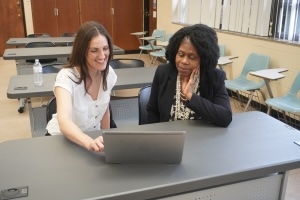Maryland Today | UMD Ranked a Top 5 School for Entrepreneurship

The University of Maryland climbed into the nation’s top five colleges for cultivating student entrepreneurialism, according to rankings released today by The Princeton Review and Entrepreneur magazine.
UMD placed No. 5 across all institutions—up two spots from last year—and No. 4 among public universities and No. 1 in the Mid-Atlantic in the 2024 edition of the annual list of undergraduate entrepreneurship programs; this marks Maryland’s ninth straight year in the top 10. The university also jumped to No. 13 for graduate entrepreneurship education, up from No. 18.
The university’s ascent into the upper echelon of the entrepreneurship ranking is due to a broad and robust innovation and entrepreneurship ecosystem that spans the campus, said Dean Chang, UMD’s chief innovation officer.
“What makes the University of Maryland stand out is that we are constantly offering more opportunities for students in any major to learn and practice innovation and entrepreneurship skills, and then apply them to creating solutions to society’s grand challenges,” Chang said. “It’s so gratifying to see the University of Maryland break into the top 5, where we belong.”
While many entrepreneurship rankings focus only on a university’s business school, The Princeton Review reflects a university’s campuswide entrepreneurship ecosystem, analyzing a variety of factors including academic offerings, mentorships, competitions, programs, centers and faculty support.
Nearly one in four undergraduates—more than 7,000— in 89 majors are enrolled in undergraduate entrepreneurship courses at UMD, taught by 59 faculty members across 30 departments. Beyond traditional entrepreneurship, UMD also offers over 100 courses in innovation-related areas like creativity, entrepreneurial mindset, social value creation, business models and design thinking.
[UMD Initiative to Award Up to $2M for Student Solutions to Grand Challenges]
A recent high-profile example of the university’s commitment to student entrepreneurship is the new xFoundry@UMD, an XPRIZE-inspired initiative aimed at recruiting and training Terps to work across disciplines and build solutions designed to address complex global problems.
“We want students to know that careers can begin with doing something significant for our society, while also creating a profitable, self-sustaining and successful business venture,” said Amir Ansari, who oversees the xFoundry as co-founder and executive director of UMD’s E.A. Fernandez IDEA Factory, a high-tech workshop focused on collaboration across all 12 schools and colleges on campus.
Academic units help UMD get high marks across the board, Chang said, from the Academy for Innovation and Entrepreneurship in the Division of Academic Affairs to the Dingman Center for Entrepreneurship in the Robert H. Smith School of Business to the Maryland Technology Enterprise Institute (Mtech) in the A. James Clark School of Engineering to the Do Good Institute in the School of Public Policy, among others. Meanwhile, financial aid and scholarships like those awarded through the Southern Management Leadership Program, which provides tuition to diverse, community college transfer students, are another important criterion. In addition, student-led innovation programs like Startup Shell, Bitcamp and Technica are critical distinguishing factors for UMD.
It also doesn’t hurt that the university boasts an impressive list of alums who went on to launch highly successful business ventures, including Sergey Brin ’93, co-founder of Google, Anthony Casalena ’03, founder and CEO of Squarespace; and Kevin Plank ’96, founder, executive chairman and brand chief of Under Armour.
“While we’re proud of the reputation we’ve earned for alumni going on to launch billion dollar startups, or unicorns, we’re even more proud of our focus on applying an entrepreneurial mindset to creating economic and societal impact. Social innovation and entrepreneurship has been a key driver for so many students getting involved,” Chang said, highlighting the university’s Grand Challenges grants program and the annual Do Good Challenge.
Many of the same initiatives that helped land UMD near the top of The Princeton Review’s rankings also contributed to the university recently earning its second consecutive Innovation & Economic Prosperity designation from the Association of Public and Land-grant Universities (APLU), a distinction reserved for institutions who “demonstrated a substantive, sustainable and institution-wide commitment to and strategy for regional economic engagement, growth and economic opportunity,” according to APLU’s website.
“The university’s strategic plan prioritizes efforts to bolster innovation, entrepreneurship and inclusive economic development, all of which were key factors in receiving accolades from both the APLU and The Princeton Review,” said Vice President for Research Gregory F. Ball. “So many people across the campus deserve credit, and we should all be tremendously proud to work at a university that prioritizes ingenuity and creativity in all that we do.”



